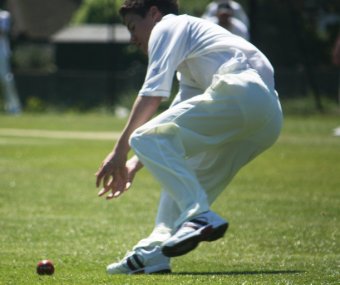
 |
| Index | |
|
|
|
|
|
| Field, Fielder, Fielding  Consequently a fielder is said to 'field' the ball. There are certain things that fielders are not permitted to do. Until the ball has reached the striker they must not encroach on or over the pitch. The penalty for this is the umpire calling and signalling a No ball. Nor are fielders allowed to make a deliberate attempt to distract the striker while he is receiving or preparing to receive the ball, or to distract or obstruct either batter after the ball has been received. Such unfair play can bring the rewards of Dead ball being called, the award of 5 Penalty runs to the batting side and subsequent reports to the appropriate authority Fielders traditionally 'walk in' from certain fielding positions as the bowler runs up to bowl and this is permitted, but they must not make what is called significant movement sideways or backwards until the ball has reached the striker. If they do the umpire should call and signal Dead ball A fielder is allowed to field the ball with any part of his person, but he's not permitted, for instance, to catch the ball in his cap, or pull out the bottom of his sweater to make a cradle in which to catch it. Unless he is himself the wicket-keeper, a fielder can't use a discarded wicket-keeping glove with which to field the ball. If the ball hits a piece of equipment - a cap or a sweater perhaps - that has been deliberately discarded this, too, is regarded as illegal fielding As any of these events occur the ball immediately becomes dead, though the umpire will usually make sure everyone knows this by calling and signalling Dead ball. He should then award 5 Penalty runs to the batting side, who are also credited with any runs that have been taken by the batters, including the one in progress if they have crossed. The delivery will not count as one of the over. If the illegal fielding was deliberate, reports will be made about it, if accidental, they will not The exception to the 'hitting equipment' rule is when a fielder's cap or hat falls off his head while he is chasing the ball. Since losing his headgear was not a deliberate act, if the ball happens to hit it lying on the ground that is not regarded as illegal fielding, and play just continues in the normal way The umpires must be informed of the reason if a fielder leaves the field of play, and that fielder is not allowed to return to it without an umpire's consent. If he does so, and comes into contact with the ball while it is in play, not only does that ball become dead but 5 Penalty runs should be awarded to the batting side and the umpires should report the incident as soon as practicable. Furthermore, the delivery will not count as one of the over If a fielder is off the field for fifteen minutes or longer, he is not allowed to bowl until he has been back on it for at least the length of playing time he was absent. This time penalty only carries over into a second innings if there is a follow-on; it does not carry over into a new day's play. If there is an interruption in play and the fielder who was absent when it started returns to the field immediately afterwards, the time lost for the interruption is deducted from his bowling 'time penalty'. |
||||||